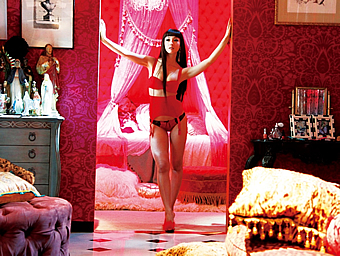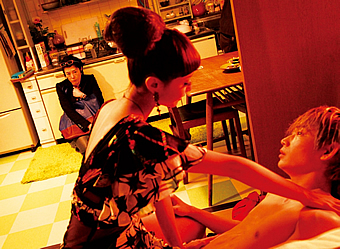HELTER SKELTER (2012)
Genre: Drama
Director: Mika Ninagawa
Cast: Erika Sawajiri, Nao Omori, Shinobu Terajima, Gou Ayano, Kiko Mizuhara, Hirofumi Arai, Anne Suzuki, Susumu Terajima, Kaori Momoi, Sho Aikawa, Mieko Harada, Yosuke Kubozuka
Runtime: 2 hrs 7 mins
Rating: R21 (Sexual Scenes)
Released By: Encore Films & Shaw
Official Website: http://www.ninamika.com/
Opening Day: 21 March 2013
Synopsis: The sexiest and most controversial Japanese blockbuster. Lilico (Erika Sawajiri) is a supermodel whose perfect appearance and style make her the object of intense jealousy among young women. At the top of the entertainment industry, she is everywhere, all over Japan. But Lilico has a deep, dark secret…. She undergoes multiple cosmetic surgery to her entire body. Lilico makes the lives of those around her miserable as she tries to deal with career and personal problems.
Movie Review:
Its posters and other promotional materials may sell it based on skin and sex, but there is really so much more to former fashion photographer turned director Mika Ninagawa’s sophomore film ‘Helter Skelter’. At the risk of sounding clichéd, what you think you know about the movie is really only skin-deep, as this adaptation of Kyoko Okazaki’s award-winning manga proves to be one of the most riveting Japanese films we’ve seen in a long while - thanks to its bold take on an absolutely timely subject.
Essentially a cautionary tale on the pursuit of beauty and fame, it weaves a compelling psychosexual horror drama around a fictional celebrity named Lilico. Rather than start at the beginning, Ninagawa introduces her audience to Lilico at the height of her popularity, the latter’s flawless doll-like features and to-die-for figure making her the object of desire for young girls around the country. Every teenage girl wants to be like her, and that in turn has made her the subject of intense media interest, which explains her appearance on almost every fashion magazine and her crossover into the world of movies.
Unbeknownst to her adoring fans, everything about her is manufactured – well, except her “eyeballs, ears, fingernails and pussy”. The extent of her radical makeover is never shown, but hinted at especially with the sudden appearance one day of her sister, a plump and dorky girl whom you would never in your wildest imaginations ever think was related to Lilico. Her individuality stripped completely in order for her to be the vessel of others’ desires, Lilico thrives on the affirmation of her adulating fans, most of whom are no less shallow than her.
A more conventional narrative might have opted to paint Lilico as someone we are supposed to sympathise with, but Kaneko Arisa’s script eschews such contrivances in favour of a fully formed character study. Much as we might be inclined to empathise with her for being manipulated by her talent agency boss, a domineering mother figure whom Lilico calls Mama (Kaori Momoi), we also learn that she is no angel on the inside, especially in the way that she psychologically manipulates her assistant Michiko (Shinobu Terajima) and the latter’s boyfriend Shin (Go Ayano).
Like a tightly coiled spring, Ninagawa carefully builds the tension as Lilico’s precarious life unravels bit by bit. Turns out that Lilico’s plastic surgery clinic uses illegal – and worse, unsafe – methods on their clients, and is being investigated by a public prosecutor named Makoto (Omori Nao). Not only does Lilico find her seemingly perfect façade crumbling with black patches, the drug she injects into her body to maintain her decaying complexion gives her hallucinations, her brittle state of mind further battered by her declining popularity following the rise of a new fresh-faced model Kiko (Yoshikawa Kozue).
Truly remarkable is the razor-sharp precision by which Ninagawa portrays the dangers and pitfalls of modern-day society’s obsession with beauty and fame. On one hand, the movie criticises the celebrities who would go under the knife just to look more and more like what others would love for them to; on the other, it chastises the hypocritical nature of their fans, who would be just as effusive in idolising them as they are swift in switching loyalties. Without one, there would not be the other, and Ninagawa makes an empathetic point that either is equally culpable for constructing and reinforcing a vision of beauty that is ultimately unattainable.
But more than just social commentary, Ninagawa offers an experience in her film that deserves to be felt. Part of that is the visual palette she has chosen, from the playful colours of Lilico’s photography sets to the garishly red-saturated interiors of Lilico’s apartment to the simple but no less memorable image of a blue butterfly in Lilico’s hallucinations. Part of that is also her stylishly executed shot compositions which – combined with some nifty techniques she deploys – make for plenty of visual fodder to keep you fascinated.
All that visual trickery would be for naught without a strong character-driven narrative – and this is where Arisa’s script truly shines. Every character is clearly defined in relation to Lilico – whether is it the authoritarian Mama who had helped shape Lilico in the form of her youthful self, or the over-accommodating Michiko whose blind allegiance to Lilico destroys her life, or Lilico’s one and only romantic interest Nanbu (Yosuke Kubozuka) who leaves her to marry a politician’s daughter – and what is especially interesting is the consistent use of a narrative device that where each of these characters speaks to the audience to give his or her perspective on Lilico.
Such an approach means that a lot hinges on Erika Sawajiri’s performance as Lilico, and thankfully she is absolutely stunning in the role. Returning to showbiz after a five-year absence, Sawajiri inhabits the character completely, her brave and utterly committed portrayal of a starlet’s fall from the heights of celebrity heavens spellbinding in its intensity. Veterans Momoi and Terajima provide fine supporting acts, but the show belongs absolutely to Sawajiri, letting her audience feel ever so keenly Lilico’s fears, insecurities, anxieties, and motivations.
Both as a richly realised character study as well as a sharp critique on today’s celebrity culture and obsession over beauty, ‘Helter Skelter’ rises tall above its soft-porn impressions to amaze as one of the rare Japanese films that works as biting social commentary. Sure, some might argue that it tends to go over-the-top with an almost surrealistic feel, but that very quality makes it all the more mesmerising to examine what is in itself a seemingly ludicrous preoccupation. It is dark comedy at its very best, fascinating to watch every step of the way and perhaps one of the most unique films you’ll see this year.
Movie Rating:





(Unlike anything you’ve seen before, this spellbindingly original character study of the price of stardom and social critique on the folly of chasing beauty has visual dazzle, arresting themes, and a fearless performance by Erika Sawajiri)
Review by Gabriel Chong
You might also like:

Movie Stills








